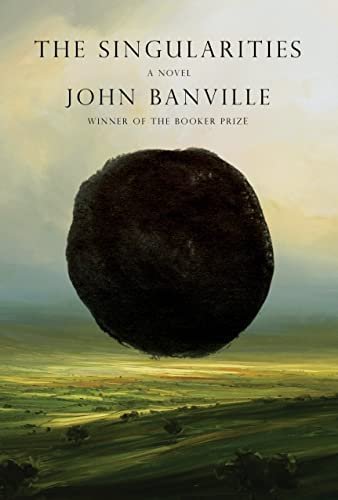The Best Books of 2022: Fiction
/Best Books of 2022: Fiction
2022 was one of the most dire years for fiction in living memory, mainly for one stark and bizarre reason: the entire genre of fiction virtually disappeared from the map, washed away in a tsunami of so-called “auto-fiction,” in which authors abandoned even the pretense of actually, you know, making things up, deciding instead to transcribe their Twitter feeds and sprinkle in a few quotation marks. When confronted with this obvious, naked marketing fraud, various writers of “auto-fiction” have affected affront, virtually saying, “How can you possibly criticize my novel? Every word of it really happened!” This is an End Times kind of situation for a literary genre, but fortunately, the rot isn’t universal quite yet; the Year of Auto-Fiction was also a year of several first-rate works of legitimate fiction. These were the best of them:
10 The Singularities by John Banville (Knopf) – Given how disastrously certain other authors dealt with quantum physics in fiction this year, the mere hint that John Banville likewise touches on that dilettante’s paradise might have been cause for alarm. But instead we’re starting this list with the quiet, quicksilver competence this author always brings to this story of a man confronting a quantum-infused variety of roads not taken.
9 Demon Copperhead by Barbara Kingsolver (Harper) – Pastiches of any kind always traffic in lowered expectations, which makes Barbara Kingsolver’s modern-day southern-Appalachia adaptation of David Copperfield all the more surprising for its sheer inventive energy in telling the story an unwanted but terrifically charismatic young boy making his way in the world. This is as sharply passionate and funny as Kingsolver’s books have been in a decade.
8 Night of Plague by Orhan Pamuk (translated by Ekin Oklap) (Knopf) – If this sumptuous and fantastic new book by Orhan Pamuk was honed by the real-life experience of a world-wide pandemic, then it’s easily one of the best books to appear in the direct wake of that collective trauma, which is here transported to the Ottoman Empire of 1900, when a sultan must try to contain a plague. All of Pamuk’s skills are here in lavish amounts, without every resorting to the bathos of cheap allegory.
7 Lessons by Ian McEwan (Knopf) – This surprisingly sprawling novel from Ian McEwan plays out its young protagonist’s across the whole of the second half of the 20th century as he develops a passionate relationship with his piano teacher and then deals with the fallout of that for the rest of his life. The narrative is baggier than McEwan’s customary approach, and it oddly suits the breadth of his canvas.
6 Booth by Karen Joy Fowler (Putnam’s) – The celebrated – and now infamous – Booth family of actors has occasioned their share of group-biographies, but the weird confluence of social and national forces running through their lives has never been captured more elaborately, more honestly, than in this piece of historical fiction from Karen Joy Fowler, which is shot through with such an alarming variety of darknesses that it ends up making the book feel like a fictional X-ray of an entire century.
5 Haven by Emma Donoghue (Little, Brown) – Emma Donoghue’s knack for locating her stories in the middle of exigent circumstances continues strong in this novel about three men in seventh-century Ireland seeking to found a monastery on a bare rock jutting out of the Atlantic. This isn’t the first time Donoghue has examined the clash of raw faith and raw isolation, and in this case the result is vividly memorable.
4 Horse by Geraldine Brooks (Viking) – In the mid-20th century, a New York City gallery owner unearthing the story of a equestrian oil painting forms the narrative vector for Geraldine Brooks to flesh out the story a strange three-way relationship between a champion racing horse, the groom who understand the horse best, and the painter who captures both of them on canvas. The narrative winds and uncoils in the manner Brooks has mastered.
3 The Kingdom of Sand by Andrew Holleran (FSG) – This novel, Andrew Holleran’s first in nearly two decades, continues the beautiful and bewildering reading experience of watching this author’s narrative voice grow older and more whetted with every new work. In these pages an unnamed narrator looks back at decades of gay life in post-AIDS American gay life (with insistent digressions on the ironies of old age), and it’s all shaped with Holleran’s undimmed brilliance.
2 Young Mungo by Douglas Stuart (Grove Press) – This follow-up by Douglas Stuart to his universally-praised Shuggie Bain is likewise a story of doomed, thwarted gay love in working-class Glasgow, and it demonstrates that Stuart’s debut was no lucky fluke by being every bit as beautiful and jagged and moving as its predecessor. In a mere two novels, Stuart has firmly established himself as a major talent.
1 Poguemahone by Patrick McCabe (Biblioasis) – Considering how strange a year 2022 was for fiction, with 90% of the things labeled “novels” containing no fiction, with “novelists” complaining about the grindstone while spending all day on Twitter, and so on, it’s perhaps fitting that this, the best novel of 2022, is likewise very strange, rushing forth in a flow of verse and black humor and real pathos in telling an Irish story to end all Irish stories. This has been a deeply disappointing year when it comes to fiction; it’s gratifying to end it with a masterpiece.











